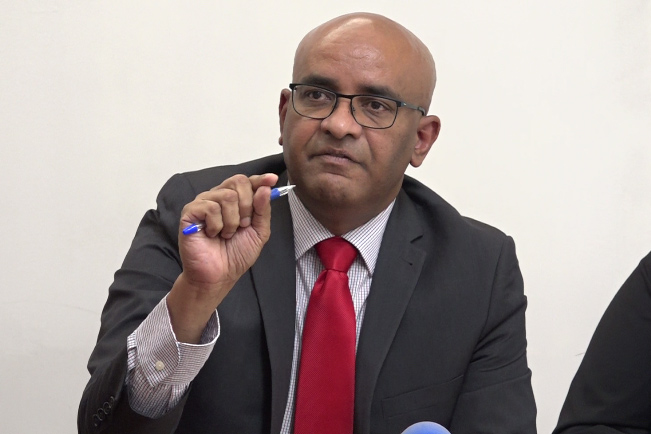The Caribbean Court of Justice (CCJ) today upheld presidential term limits enshrined in the Guyana Constitution meaning that former President Bharrat Jagdeo will be ineligible for another term.
President of the court, Sir Dennis Byron read the decision of the court at the Trinidad-based final court.
The CCJ decision overturns the Guyana Court of Appeal decision which had upheld a High Court decision by former Chief Justice Ian Chang.
In a majority 6-1 ruling, Guyana’s court of last resort overturned the ruling by the local Supreme and Appeal Court that a former president can run for more than two terms.
On March 12 this year, in a more than six-hour long hearing before the CCJ, attorneys for the state argued that amendments to effect the presidential term limit were done in accordance with the Constitution, even as those representing the challenger maintained that a referendum was required and that the two-term restriction is unlawful.
The attorneys on both sides defended their respective positions before the Trinidad-based final court on the challenge mounted to term limits by private citizen Cedric Richardson.
The state had appealed decisions by both the Supreme Court and the Guyana Court of Appeal in favour of Richardson, who in the run-up to the 2015 general elections had challenged restrictions created by amendments to Article 90 of the Constitution that were enacted in 2001 after the bipartisan Constitution reform process.
His argument had been that Act No 17 of 2001, which was passed by a two-third majority of all elected members of the National Assembly to effect the term-limits, “unconstitutionally curtails and restricts” his sovereign and democratic rights and freedom as a qualified elector “to elect the person of former president Bharrat Jagdeo” as executive president.
The amended Article 90 of the Constitution states at Clause 2(a) that a person elected as president after the year 2000 “is eligible for re-election only once” and at Clause (3) that a person who acceded to the presidency after the year 2000 and served therein on a single occasion for not less than such period as may be determined by the National Assembly “is eligible for election as president only once.”
On July 9th, 2015, former Acting Chief Justice Ian Chang declared that the presidential term-limit was unconstitutional without the approval of the people through a referendum. He had cited the violation of the basic structure of the constitution. In February, 2017 former acting Chancellor Carl Singh, and now retired Justice B S Roy dismissed the state’s appeal to Justice Chang’s ruling. Dissenting was then acting Chief Justice Yonette Cummings-Edwards.

Jagdeo had distanced himself repeatedly from the case and had said that he had no interest in running for a third term. However, he is now the Opposition Leader and General Secretary of the PPP/C. It is that party’s General Secretary who has traditionally been its presidential nominee. On Saturday he also issued a statement saying that irrespective of the CCJ decision he remains the General Secretary of the PPP and will play an active role in any future PPP/C government.
The full judgment of the Court and a judgment summary are available below:
[gview file=”https://www.stabroeknews.com/images/2018/06/Cedric-Richardson-Executive-Summary.-June-25.pdf”] [gview file=”https://www.stabroeknews.com/images/2018/06/Richardson-v-AG-Guyana-Judgment-June-25-2018-Attorney-at-Law.pdf”]

